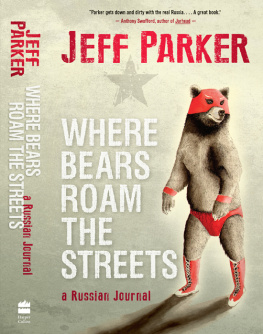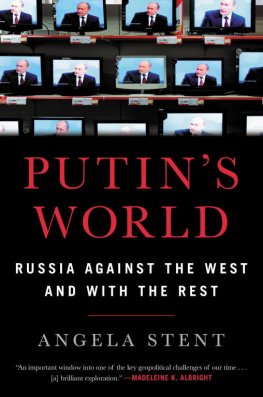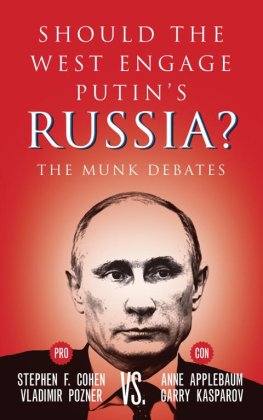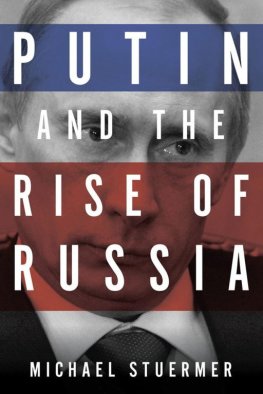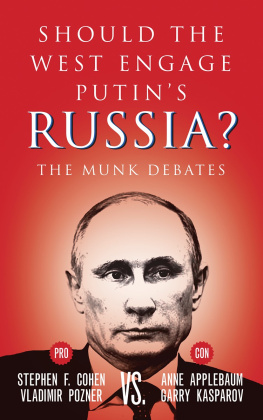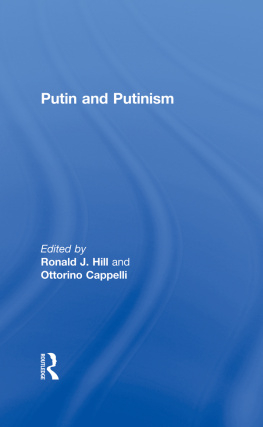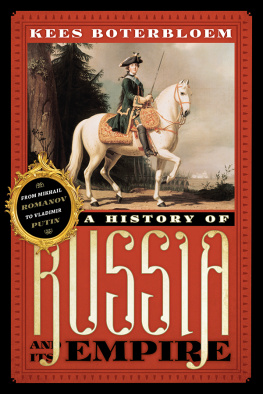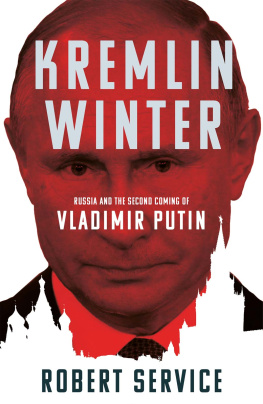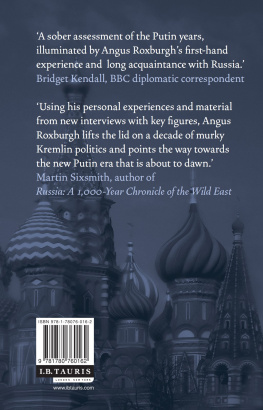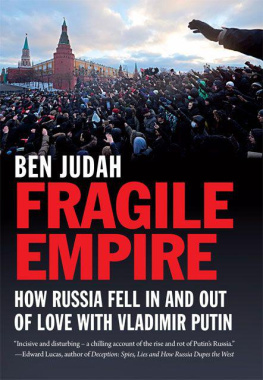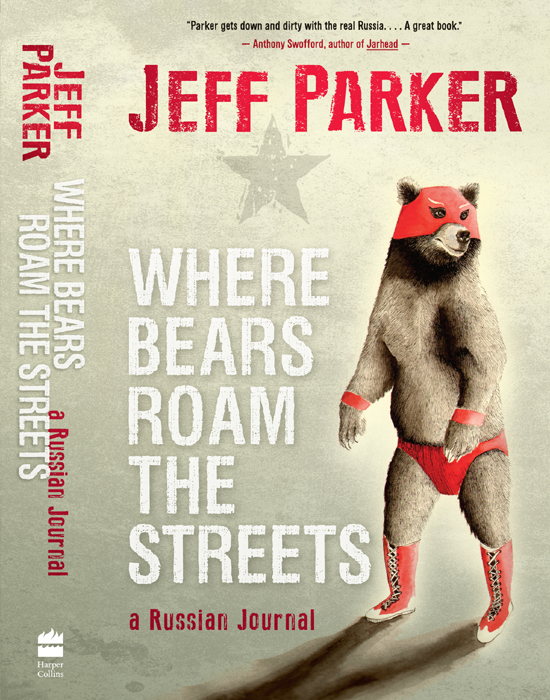WHERE BEARS ROAM THE STREETS
A RUSSIAN JOURNAL
Jeff Parker

Y ou cant call a summer night in St. Petersburg, Russia, night. You can, but youll be lying. They call them white nights, but thats a lie too. Theyre not night, and theyre not white. Usually, at the darkest point, theyre a purplish hue. Id seen that colour before my first trip there. Id seen it in oil floating on the surface of water, and on the back of a skink.
One of these so-called white nights in the summer of 1999, I was crossing the bridge along Nevsky Prospekt at around three in the morning when I heard a splashing in the Griboyedov canal below. I was with a Canadian woman, also a tourist there for the same writers conference. Jennifer seemed inclined to have an affair with pretty much anyone except me. So, naturally, I was drawn to her. We hurried across the street and hung over the edge of the bridge as the splashing came closer. There was a group of drunk tourist-boat captains on a dock looking toward the tunnel and cheering. Boats were moored to the dock in a chain stretching across the canal.
A swimmer appeared, moving at tremendous speed under Nevsky Prospekt. He passed between two of the moored boats and in one motion emerged out of the black water onto the dock, where the ship captains cheered. The men patted him on the back and passed him a bottle of beer. Just fifty metres beyond him, the golden domes of the kaleidoscopic Church of the Saviour on the Spilt Blood reflected the skink-back light of the night sky.
Jennifer was entranced by him. I was too. The mere fact that he was brave enough to swim in that water impressed me. We had heard that the Russian mafia disposed of bodies in the canals. Raskolnikov wandered the banks of this canal in Crime and Punishment, contemplating the murder of the pawnbroker in water the colour and depth of the pupil of an eye. This canal in particular repulsed Dostoevsky, and he referred to it as a ditch.
Later, Igor would tell me that, before jumping in, he had been drinking with the captains: I wanted to be sober, and thought to swim a little bit. I thought, like, it would help. Basically, I didnt realize I was under Nevsky Prospekt. But then I realized it and swam back.
Jennifer and I walked around the corner to what had quickly become our favourite late night haunt, the 24-hour fast-food joint Laima. Gaudy orange paint on the walls clashed with the blue neon glow of the cursive Laima signage. A chandelier not unlike one Id seen earlier that day in the Hermitage hung from the vaulted white ceiling. The waitresses wore Alice-era diner uniforms complete with nurse hats. The service industry in Russia was still in its embryonic stage, and a foreigner, especially one who didnt speak a word of Russian, could be sure to absorb only abuse and indifference. But I had inscribed on a piece of paper the phonetic approximation of the words that conjured up my default meal: kartoshka s gribami (potatoes with mushrooms). I read them out loud. I mangled them. The waitress balked. She left the counter for a while and talked with one of her colleagues, leaning against the kitchen wall and chewing gum like cud. After a while she returned to give me another shot.
Jennifer and I sat on the patio to wait for our food and have beers.
It was three-thirty in the morning. The twenty-however-many hours of light in the city had short-circuited my circadian rhythms. My body no longer required sleep, only vodka and potatoes with mushrooms. The locals experience something similar this time of year. Giddiness reigns. Russian Ladasmuscular Pintosscreamed by on Nevsky Prospekt blasting techno. The Nevsky Prospekt sidewalks were packed, everyone hailing gypsy cabs and making out and ordering sausages from the food vendors and taking photos in front of the Kazansky Cathedralwhere the nose in Nikolai Gogols nineteenth-century short story The Nose stopped in for a morning service, where the czars used to marry before the Soviets turned it into the Museum of Atheism, and which is now, after the fall of the Soviet Union, an important Orthodox church again. Prostitutes left the bar Marstal, where the czars used to stable their horses, arm in arm with foreigners and Russias new rich. Armour-plated police cars trolled the side streets looking for drunken foreigners to whom they could charge fines. Bands of military men who looked like fourteen-year-old boys marched in their blue berets and epaulettes and striped navy shirts. Teenage girls galloped their horses along the Griboyedov, swigging from bottles of beer and offering rides to children in the square in front of the otherworldly onion-domed Church of the Saviour on the Spilt Blood, which was built on the spot where Czar Alexander II was assassinated after abolishing serfdom in Russia two years before Abraham Lincoln signed the Emancipation Proclamation. Across the canal from where we sat was the five-storey Singer Sewing Machine building, originally constructed in 1904, home to the American consulate a few years prior to World War II and later home to the Soviet Writers Union. At the top of the Singer building was a glass globe where, one of the local poets would later tell me, writers used to take their dates to make out, looking down on this whole scene, including what at this particular moment would be a sauced me, a drunk tourist on the Laima patio not knowing any of this.
Before I arrived in St. Petersburg, I didnt know a word of Russian. I had never been outside North America before. I didnt know that Leningrad, after Lenin, had been the name of St. Petersburg before perestroika, and that before the Revolution it had been Petrograd, after Peter the Great. Any points of familiarity with Russia came from the movies Reds and Red October and Red Heat and Red Dawn. With regard to Russian politics, I had a mild curiosity about the strange mark on Gorbachevs head. About Russians in general, I knew next to nothing. I have never been one to underestimate my own ignorance, as I have proven to myself time and time again that my capacity in this regard is limitless. My cup runneth over. But by the time I arrived in Russia, I did have some vague expectations of the place, gleaned almost completely from Gogols The Nose and Turgenevs First Love and a couple of other stories. At least Id gleaned something about the scenery and about a certain kind of character that I might expect to meet therea sadistic barber
But I didnt have anyone like Igor even remotely in mind.
Id discovered Russian billiards, and I was babbling about the game to Jennifer, who clearly didnt care. And the balls, I said, are literally the size of grapefruits. And theyre all white. And they barely fit in the pockets, and the table, the goddamn table, its like the size of the former Soviet Union itself
She was using the side of her fork to scrape the mushroom sauce off her plate and nodding her head when a voice behind her said, You like Russian billiards? The voice belonged to the guy whom wed seen climb out of the Griboyedov canal. He was sitting at the table behind us, still damp, drinking a beer, a black cylindrical case propped against the wall next to him.
I do, I said. I mean, I havent played. But I saw it. Ive seen some people play it. I have no idea. I havent played. I dont
He smiled. This is real pool game, he said. He extended his hand to Jennifer. Then, reaching across the table to shake mine, he said, Igor. No matter what cultural sensitivity program you graduated from, its impossible to suppress amusement when this name is said with this accent by a dude like this.

